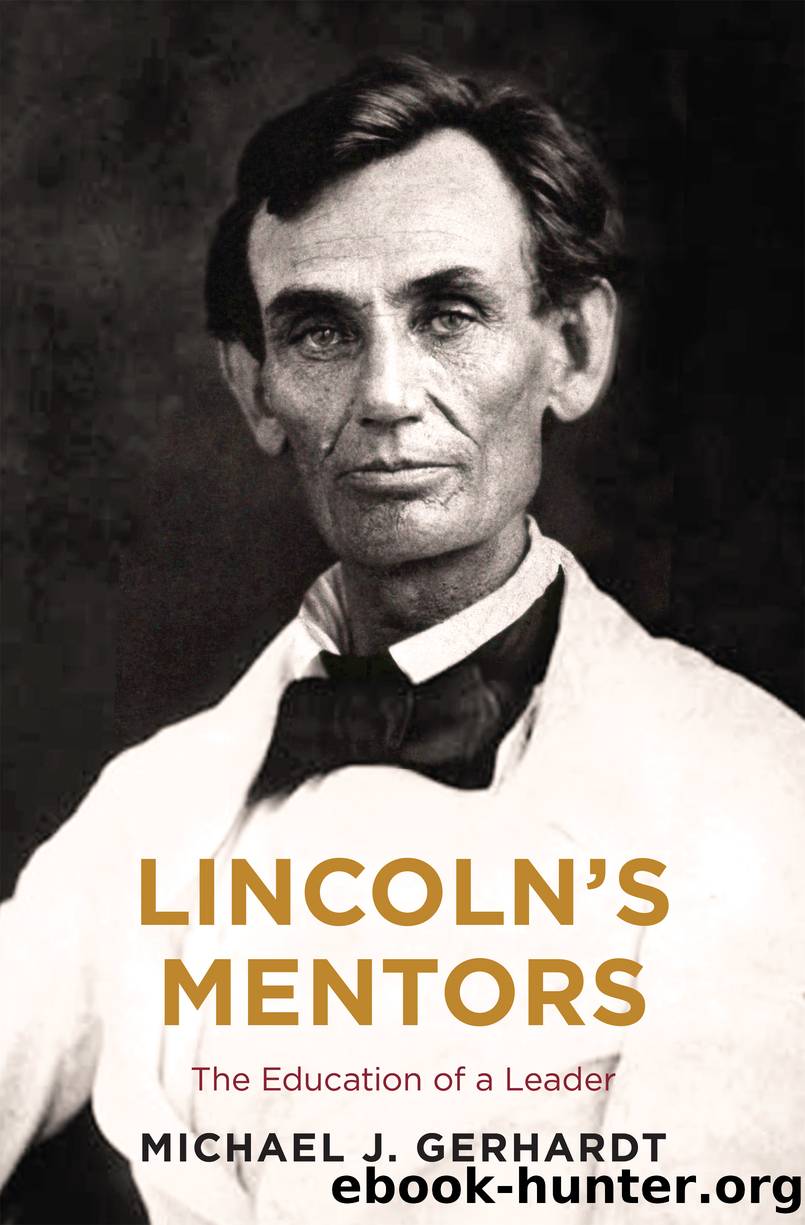Lincoln's Mentors by Michael J. Gerhardt

Author:Michael J. Gerhardt
Language: eng
Format: epub
Publisher: Custom House
Published: 2020-12-09T00:00:00+00:00
VII
* * *
After the debates, Lincoln told a friend that they âgave me a hearing on the great and durable question of the age, which I could have had in no other way; and though I now sink out of view, and shall be forgotten, I believe I have made some marks which will tell for the cause of the civil liberty long after I am gone.â93 He told another friend, âThe fight must go on. The cause of civil liberty must not be surrendered at the end of one, or even, one hundred defeats.â94 If the great question of the day was the future of slavery, and if Douglas was the likely Democratic nominee for president, Lincoln knewâand anyone reading newspapers reporting the debates around the country knewâthat everyone could see there was only one Republican in the country who had stood on the same stage as Douglas for seven straight debates and given as good as he got. It was unimportant that Lincoln was not in the Senate to debate Douglas. He had already more than held his own with Douglas in public, while the other contenders for the 1860 presidential election had not done as well when they had the chance in Congress.
Notwithstanding the themes he had sounded in his debates with Douglas, the Lincoln of 1858 and 1859 was not a starry-eyed follower of Clay, nor was he unmindful of the genuine challenges facing his party and the country. He had learned from not only Clayâs successes but his failures. As far back as 1852, Lincoln suggested that the âsignal failure of Henry Clay, and other good and great men, in 1849, to effect anything in favor of gradual emancipation in Kentucky, together with a thousand other signs, extinguishes that hope utterly.â He added, âNot a single stateâ had abolished slavery since the founding era. âThat spirit,â he said, âwhich desired the peaceful extinction of slavery has itself become extinct. [The] Autocrat of all the Russias will resign his crown, and proclaim his subjects free republicans sooner than will our American masters voluntarily give up their slaves.â As for the ultimate fate of slavery, Lincoln said, âThe problem is too mighty for me.â He said âpeaceful, gradual emancipationâ was no longer a viable option in the United States.95
Lincoln the pragmatist would not say this out loud in his debates with Douglas or in public. If he had, it would have ended all hope of his appealing to anyone who did not want to embrace slavery as the most outspoken Southerners did. The Kansas-Nebraska Act, Bleeding Kansas, and the splintering of the Democratic Party presented the newly established Republican Party with an opening it could exploitâand Lincoln planned to do so.
Rather than back away from pushing for the extension of slavery for the sake of another last-minute compromise to save the Union, Jefferson Davis did the opposite. On July 6, 1859, he proclaimed, âThere is not probably an intelligent mind among our own citizens who doubts either the moral or legal right of the institution of African slavery.
Download
This site does not store any files on its server. We only index and link to content provided by other sites. Please contact the content providers to delete copyright contents if any and email us, we'll remove relevant links or contents immediately.
Blood and Oil by Bradley Hope(1461)
Wandering in Strange Lands by Morgan Jerkins(1281)
Ambition and Desire: The Dangerous Life of Josephine Bonaparte by Kate Williams(1274)
Daniel Holmes: A Memoir From Malta's Prison: From a cage, on a rock, in a puddle... by Daniel Holmes(1250)
It Was All a Lie by Stuart Stevens;(1191)
Twelve Caesars by Mary Beard(1135)
The First Conspiracy by Brad Meltzer & Josh Mensch(1075)
What Really Happened: The Death of Hitler by Robert J. Hutchinson(1066)
London in the Twentieth Century by Jerry White(1046)
Time of the Magicians by Wolfram Eilenberger(1026)
Twilight of the Gods by Ian W. Toll(1020)
The Japanese by Christopher Harding(1017)
A Woman by Sibilla Aleramo(1000)
Cleopatra by Alberto Angela(993)
Lenin: A Biography by Robert Service(980)
The Devil You Know by Charles M. Blow(929)
Reading for Life by Philip Davis(927)
1965--The Most Revolutionary Year in Music by Andrew Grant Jackson(870)
The Life of William Faulkner by Carl Rollyson(866)
